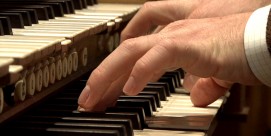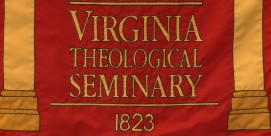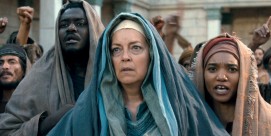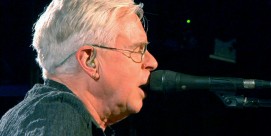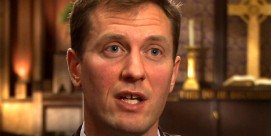Religion and Downton Abbey
As Season 3 of Downton Abbey unfolds on PBS, we asked Rev. Ian Markham, dean and president of Virginia Theological Seminary, to ponder religious and spiritual themes in the series, from the invisibility of God to the relationship between faith and a rapidly changing social order.
REV. IAN MARKHAM (Dean and President, Virginia Theological Seminary): Downton Abbey is a remarkable series. It’s both a costume drama and an imaginative soap opera. It’s got a superb script, the dialogue is riveting, and it captures the complexity of human life in all its richness. There are many shadow-sides to many of the characters that enables a viewer to empathize and be moved with the narrative and with the stories that develops and grows.
We see how organization of form of a society can be eroded or undermined by the complexity and predicaments that individuals get into, and the truth about being human is we’re all like that. There’s that lovely phrase Lord Grantham uses in talking to Carson, and he says there are chapters of all our lives we’d rather not be read by others. What’s interesting about that moment is it captures a sub-theme of the entire series, that what’s true of most lives is there are complexities in our past, there are ambiguities, there are moments of pain that we live with that affects the present, but we don’t want to share with everybody.
LADY MARY CRAWLEY: Papa? What’s the matter?
ROBERT, EARL OF GRANTHAM: Nothing’s the matter. What should be the matter?
REV. MARKHAM: Religion plays a very interesting role in the series. On one level, it’s relatively invisible. But you would expect religion to be more present in their lives. You do see the connection between religion and cosmic events in this respect: It’s a social commentary in many ways. It’s a social history. So you get the Titanic, you get World War I, you get the emancipation of Ireland, you get the vote of women, you have all these significant social events which actually reflects on a sort breaking down of the semi-feudal structure, aristocratic control and elitism being slowly undermined.
VIOLET, DOWAGER COUNTESS OF GRANTHAM: Are you really that tall?
WILLIAM: Yes, my lady.
VIOLET: I thought you might be walking on stilts.
REV. MARKHAM: And there is a sort of interesting question about whether or not the sort of disequilibrium that makes up the present in Season 3 is a spiritual failing. There are practices, faith practices which come out repeatedly, so there’s quite a lot of praying that goes on. Lady Mary prays for Matthew when he’s injured in the war with real passion and sincerity. So prayer is actually an important sub-theme, and there is a sense in which it is a classic form of English Anglicanism, which in many ways is very supportive of traditional structures, and as those traditional structures break down the English Anglicanism is undermined and eroded as well.
One way in which the series is actually very illuminating is to think about faith and change, to think about social order and faith, to think about the ways in which we’ve got to adapt to a plural society. I mean, what’s very interesting about Season 3 is the whole issue of Catholicism. You’re talking English anti-Catholicism is deeply entrenched. How does an established form of religion adapt to an increasingly complex world with intrinsic pluralism of faith perspectives and a social order which doesn’t just enjoy the habit of Anglicanism?
VIOLET: I’m so looking forward to seeing your mother again. When I’m with her I’m reminded of the virtues of the English.
MATTHEW CRAWLEY: But isn’t she American?
VIOLET: Exactly.
REV. MARKHAM: Those one-liners from Maggie Smith are just sublime. Sometimes wicked, sometimes insightful, sometimes wrapped in prejudice, and she utters the lines we all wish we could utter. And there’s a deep biblical strand which celebrates and reflects on the power of conversation.
ROBERT (to Cora): Thank God she missed tonight’s drama, or we’d never hear the end of it.
CORA, COUNTESS OF GRANTHAM: Don’t worry. She’ll bring enough drama of her own.
ROBERT (to banker): Are you really telling me that all the money is gone?
BANKER: I’m afraid so.
REV. MARKHAM: This series, partly because of its powerful dialogue, captures that facet of human reality very nicely, indeed.
ROBERT: I won’t give in, Murray. I’ve sacrificed too much to Downton to give in now. I refuse to be the failure. The earl who dropped the torch and let the flame go out.
REV. MARKHAM: In many ways it’s a secular introduction to what the crisis of faith might look like. In other words, the crisis of faith is not explicitly grounded or framed in God-talk. There’s very little explicit reference to God in the television series. Grace does not take place at meals, even though there’s a lot of eating. They rarely go to church, except for a wedding, and even then you don’t see much of the wedding service. So faith is strangely non-explicit, and yet simultaneously faith is very present. And what I think the series is doing is inviting us to think of faith in a new and different way. Faith is interpreting how we relate to each other. Faith is coping with the complexity of our past. Faith is carrying the baggage that shapes us all into the present and doing so in ways that are ameliorated and less damaging. Faith is hope even when you are in a predicament of hopelessness. All these themes bubble through countlessly.
JOHN BATES: Do you never doubt? For just one minute? I wouldn’t blame you.
ANNIE: No. I don’t doubt that the sun will rise in the east either.
REV. MARKHAM: Annie’s faithfulness to her husband, Bates, who’s now in prison, is a lovely illustration of trust and hope and commitment—that somewhere and somehow and through all this there will be a different future for them both. So the series plays around with faith as the strategy and device that enables us to cope with the complexity of being human. It’s perfect material for people who want to reflect on faith and the connection of faith and life. It’s perfect because of the ways in which it lifts up the complexity of human lives and the narratives and stories that make us all who we are.

